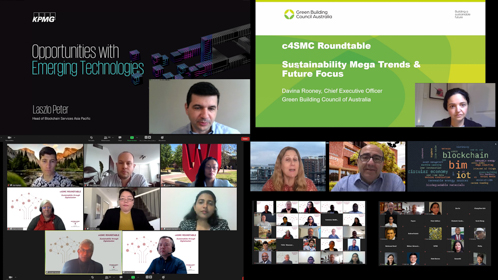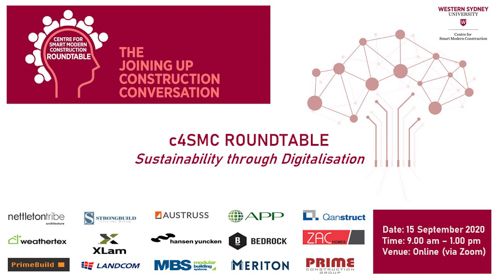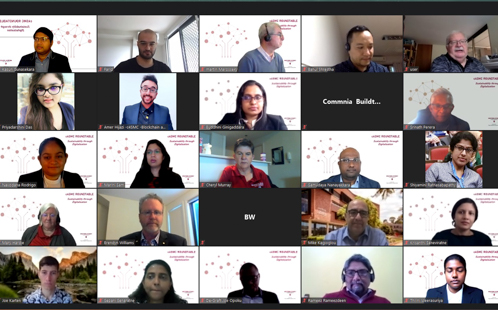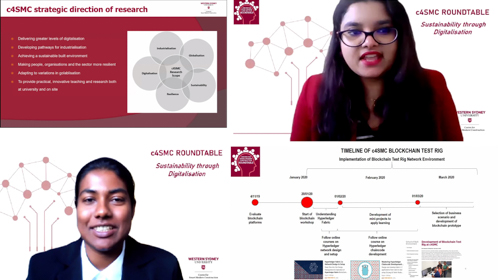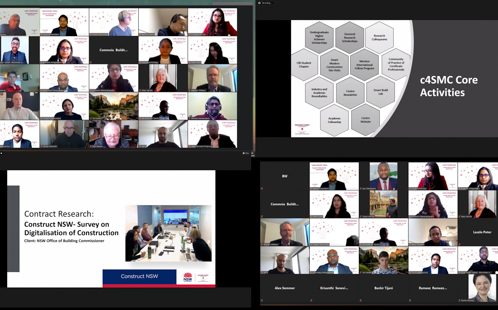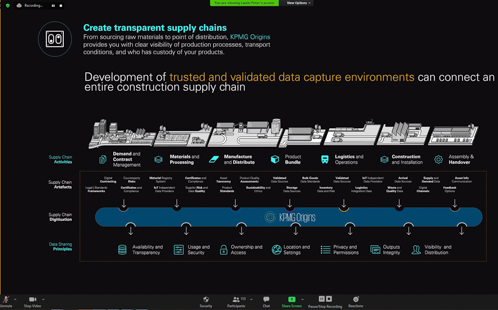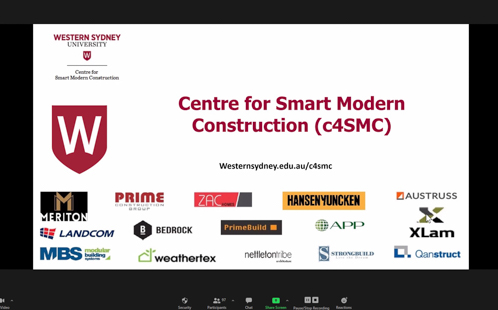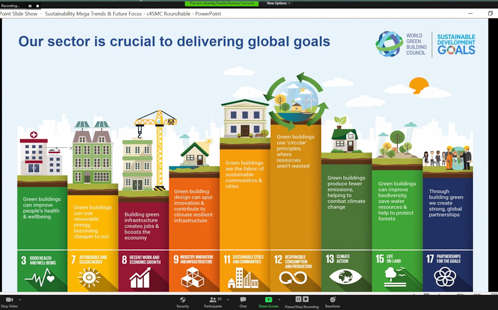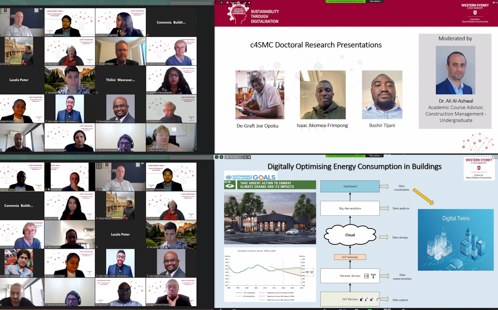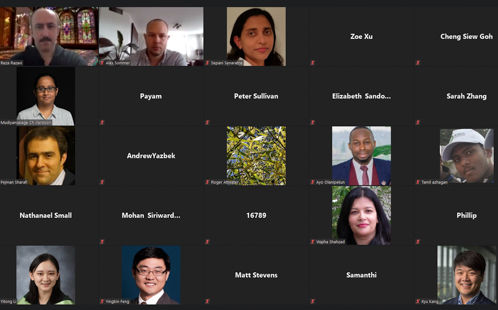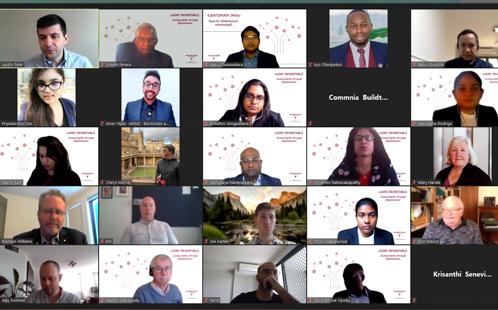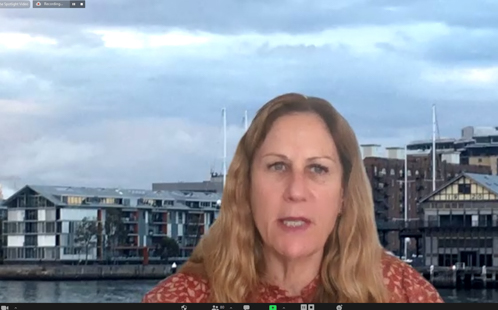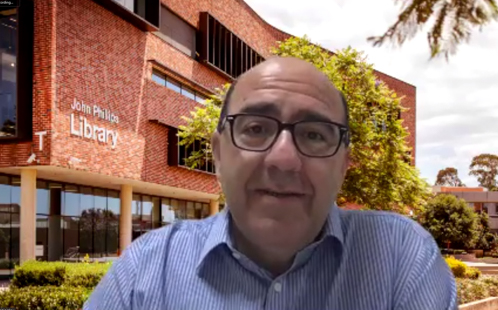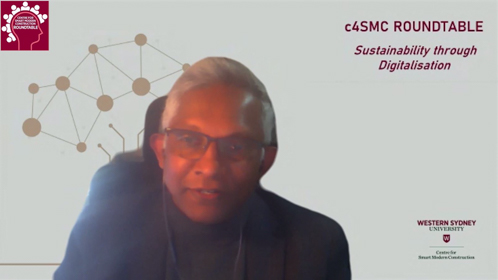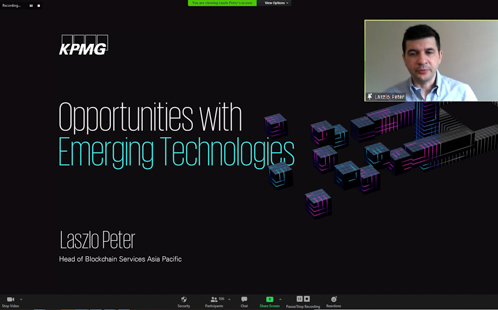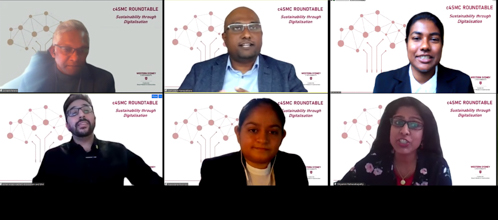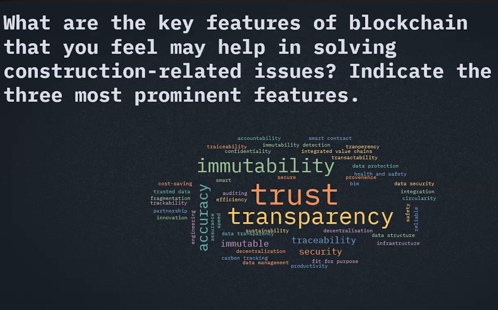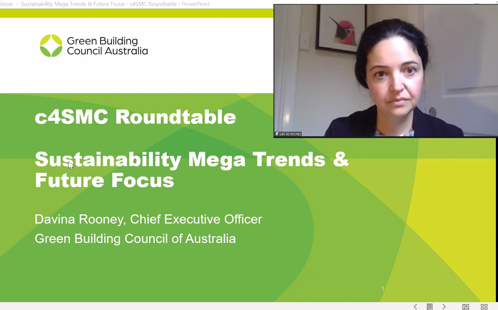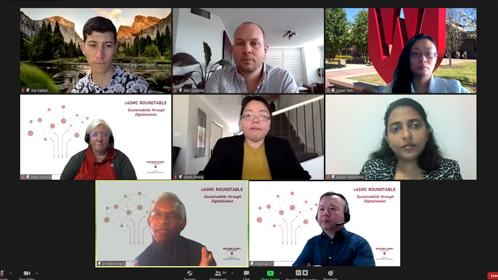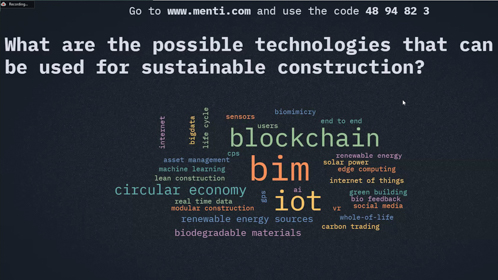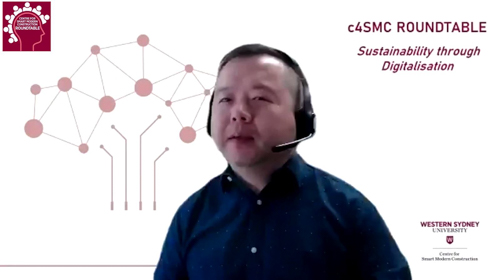- Industry Collaborators
- People
- News
- Research News
- Doctoral Research
- Research Projects
-
Roundtables
- - Academic Roundtable February 2023
- - Academic Roundtable September 2020
- - Academic Roundtable September 2019
- - Academic Roundtable April 2019
- - Academic Rountable November 2018
- - Inter-university Academic Rountable November 2018
- - Community of Practice Roundtable June 2021
- - Community of Practice Roundtable June 2020
- - Colloquium on Managing Construction in the 21st Century
- Community of Practice
- Future Constructors
- Digital Media Repository
- Training
Academic Roundtable September 2020
The Centre for Smart Modern Construction (c4SMC), on Tuesday 15 September successfully concluded its 4th bi-annual Industry- Academic Roundtable session as an online event with the participation of 237 delegates representing 31 countries. It also had over 60 attendees from industry.

The theme of this Roundtable was Sustainability through Digitalisation, where its purpose was to open a conversation to rethink digital transformation for sustainability amidst the global pandemic. In keeping with the emergent term, ‘The Great Reset’ coined by the World Economic Forum, this Roundtable aimed to provide a platform to discuss technology-inspired ways to improve construction industry performance, while facilitating environmental, social and economic sustainability.
Moving towards a more sustainable construction industry is a goal long voiced equally by industry and academia around the globe. Certainly, the environmental, social, and economic impact of construction is significant and sometimes irreversible. In Australia, at a time of accelerating climate-change challenges, actions related to sustainable construction strategies are essential. In the era of Industry 4.0, making use of advanced technology in the construction industry can potentially support all three aspects of sustainability. It is anticipated that digitalisation of the construction industry with technologies such as Blockchain, will enable the adoption of smarter, safer, and sustainable future practices.
Hence, this discourse which addressed a wide range of possibilities in adapting existing and emerging technologies to achieve sustainability in the construction sector, encompassed several of the United Nations 17 Sustainable Development Goals (SDGs). For example, the discussions responded to SDG 9 which focus to build resilient infrastructure, promote inclusive and sustainable industrialization and foster innovation, SDG 13 which focus on actions towards climate change adaptation, and SDG 17 which focus to strengthen the means of implementation and revitalize the global partnership for sustainable development.
This four-hour event comprised of keynotes, panel discussions and research presentations. First part of the event focussed on Blockchain related discussion and the later was on Sustainability aspects of construction practices.
Senior Deputy Vice-Chancellor Professor Denise Kirkpatrick, opened the service and Acting Dean of Built Environment Professor Mike Kagioglou, welcomed all speakers and delegates. This was followed by the presentation of Professor Srinath Perera, who is the Director of c4SMC, marking the 3-year anniversary of the Centre. The presentation highlighted c4SMC mission, vision, research, achievements, Centre activities and accolades of the past three years.
The first keynote speaker, Laszlo Peter who is the Head of Blockchain Services, Asia Pacific KPMG Australia, covered an important aspect for the construction industry with is presentation titled, ‘The Opportunities with Emerging Technologies’. Trends such as increasing quality requirements, speed expectations and complexity, and financial and cost pressures can be mediated by technologies like robotics, 3D printing, mobile and cloud, Building Information Modelling, 5G, modular, exoskeletons, and blockchain.
“Risks, exposure to those risks or change in legislation due to those risks and trusted reporting of that are the three key attributes where sustainability will be enabled through technology.”- Lazlo Peter
Laszlo further discussed about how distributed technologies can enable new economic communities and trusted collaboration, and how tokenised real-world assets can drive liquidity with fractional investments. Trust with customers can be built with greater transparency on certifications and sustainability credentials regarding the journey of construction products. Furthermore, creating transparent supply chains through blockchain can provide trusted and validated visibility for production processes, from raw materials to the point of distribution. Finally, data can be leveraged for better ESG impact by capturing and sharing digital certifications. Trusted accounting and transparent reporting would gain insights from high quality data leveraged from the blockchain.
Next, c4SMC Blockchain researchers Navodana Rodrigo, Samudaya Nanayakkara, Thilini Weerasuriya, Amer Hijazi, and Shiyamini Ratnasabapathy demonstrated a use case of blockchain in land registration and property management (link), and talked about issues they are attempting to solve through doctoral research, from construction supply chain procurements, work and payment certifications, integration with Building Information Modelling, estimating embodied carbon, and construction and demolition waste trading.
Intermediately Mentimeter word clouds were generated to visualise the captured views of the audience. In the first word cloud, the audience had identified some key features of blockchain that they think may help in solving issues related to construction. Trust, transparency, and immutability were the top three features named by the participants. The audience also expressed that blockchain has features that provide traceability, accuracy, security accountability, cost savings, partnership, integration, innovation, sustainability, productivity and efficiency.
Indeed, as was discussed in the sessions, blockchain builds trust through transparency and immutability of data. By providing cryptographic data protection techniques and immutability of data stored in the blockchain we can generate trust in a relatively trustless environment and assure data accuracy.
The second session focussed on sustainability and how technology could enable it. Digital transformation is not a new endeavour for business, though prior attempts have often failed to realize its full potential. It has created a shared opportunity for all. It is identified as the right time to pave a new trajectory for digital transformation that aligns with the changing role of business: to be a powerful enabler of social, economic and environmental sustainability for its stakeholders. The future will see us leveraging technology to generate sustainable value and shared success. The keynote by Davina Rooney, the CEO of Green Building Council was themed as, ‘Sustainability Megatrends & Future Focus’. Her speech focussed on climate action, resource efficiency and health and wellbeing, she mentioned that on the green building council’s short-term digital trajectory there are technologies like big data and the internet of things. While artificial intelligence is up for future considerations. The perfect coming together of digitalisation and sustainability would be in a common data model containing green star performance data, historic industry ratings etc.
Davina’s keynote was followed by 3MT style presentations by three c4SMC doctoral researchers. Their presentations reinforced the innovative integration of technology in addressing social, economic and environmental sustainability challenges. Some interesting views were shared around mental health, which has been a stigma in the industry and the statistics shown surrounding suicide in this industry were quite confronting. Diversity and Inclusion is something that is making much needed inroad into social sustainability performance of the industry.
It is identified as the right time to pave a new trajectory for digital transformation that aligns with the changing role of business: to be a powerful enabler of social, economic and environmental sustainability for its stakeholders.
A panel discussion represented by both industry and academia was the zenith of this conversation on sustainability through digitalisation. Joe Karten-National Sustainability Manager, Built and Alex Sommer - Manager Sustainability and Research, Landcom represented industry, while Prof Vivian Tam, A/Prof Mary Hardie, Dr Sepani Senaratne, and A/Prof Sarah Zhang of Western Sydney University represented academia. Joe Karten and Alex Sommer, panellists from the industry both stressed on the fact that Building smaller is the single biggest sustainable step and talked about the ‘tiny house movement’ going mainstream. Joe also put up an interesting proposition of calculating the carbon savings from conducting this event online.
Finally, MCs for the day – Thilini Weerasuriya and Priyadarshani Das who are doctoral candidates of the Centre summarised the event and presented the findings of the second word cloud on sustainability.
The event was concluded by Associate Professor Xiaohua Jin, presenting the vote of thanks. Stay tuned for the c4SMC 5th Academic-Industry Roundtable on another interesting theme soon!
Find the Event Agenda here (PDF, 240.18 KB).
Find the presentation slides of the event below:
- Davina Rooney’s slide deck on ‘Sustainability Megatrends & Future Focus’ (PDF, 4074.67 KB)
- Prof Srinath Perera’s slide deck on c4SMC (PDF, 2082.47 KB)
- A/Prof Sean Jin’s slide deck on vote of thanks (PDF, 969.41 KB)
Find presentation videos below:
RHC Buttons
Mobile options:

